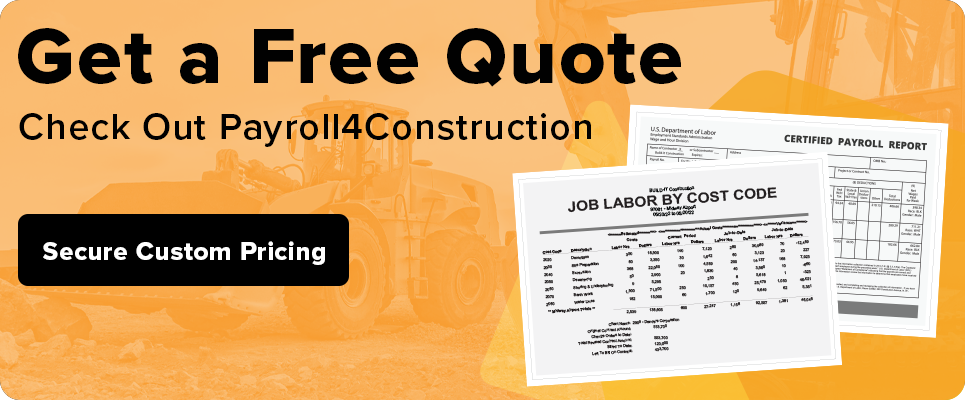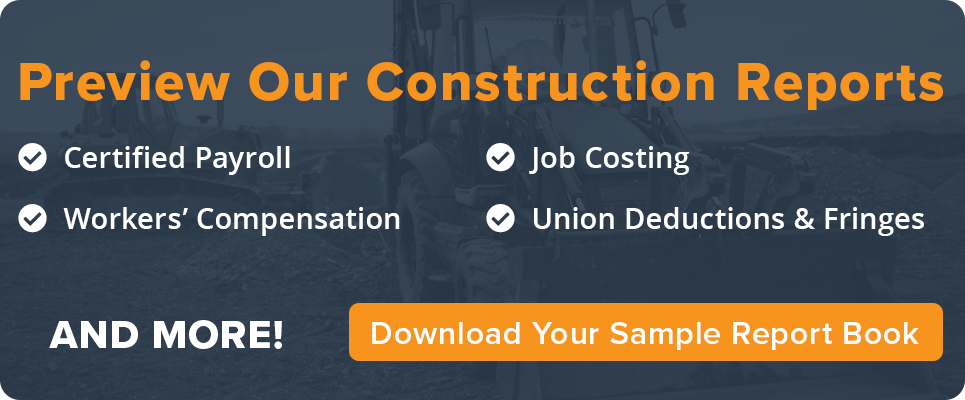The Seasonality of Construction Payroll: How to Handle Booms and Busts

October 18, 2024
The construction industry has different periods of increased work, typically due to the seasonal changes in both the economy and the weather.
For example…
In the warmer months of spring and summer, construction will become busier; as the weather conditions level out, the industry sees increased job opportunities and employee availability, allowing contractors to get and complete more work.
Other factors — including economic shifts or the recent COVID-19 pandemic — can severely affect how these seasons play out.
Though seasonal weather plays a role in the booms and busts of construction, the business of work tends to follow economic and financial patterns.
This is known as seasonality. It’s something that can be found across many industries.
These dynamic and ever-changing seasons have a unique effect on construction payroll. The industry often feels the effects of seasonal shifts, and labor costs can impact a company’s overall health.
According to research, about 20-35% of all construction costs are labor-related. This number can reach up to 40% when looking at the costs associated with employing skilled workers.[1]
This shows the critical role payroll plays in maintaining a financially healthy company during both peak and off-seasons.
The seasonality of construction poses special challenges to construction payroll, including:
- Variables and changes in workforce sizes, including new hiring and layoffs.
- Irregular cash flow resulting from fluctuating income streams.
- Tax compliance with new or updated regulations every year.
- Prevailing wage rates and fringe benefit compliance during periods of shifting employment.
However, when payroll is handled properly, construction companies can navigate seasonality efficiently, keeping workers happy and finances steady.
Key Takeaways: The Seasonality of Construction Payroll
- Construction firms face unique payroll challenges due to industry seasonality, including fluctuating workforce sizes, irregular cash flow, and the need to maintain compliance with government regulations and certified payroll requirements.
- Staying updated on construction payroll compliance is critical, especially for certified payroll reporting and managing union payrolls to meet legal obligations and avoid penalties.
- Implementing payroll solutions and streamlined payroll processes can help construction companies navigate seasonal shifts, ensure accurate reporting, and improve employee satisfaction.
- Utilizing advanced payroll systems with features like automation and analytics can enhance construction reporting, simplify certified payroll requirements, and improve overall payroll management.
- Developing strategies to handle seasonal variations, such as flexible staffing and outsourcing to specialized payroll services, can help contractors overcome the challenges of construction payroll and maintain financial stability year-round.
Navigating Seasonal Construction Payroll Processing
Due to the constantly shifting nature of the construction industry, it can be challenging for payroll processors to stay on top of seasonality.
Construction payroll is already complicated due to strict regulations, including prevailing wage and union requirements. With the added hurdle of seasonal shifts upsetting the payroll system, processors may struggle with keeping up.
Fortunately, there are many strategies for payroll processors to relieve these burdens when dealing with the seasonality of construction, including:
- Seasonal hiring patterns: Companies can utilize part-time or temporary workers during busy seasons, releasing them in the off-season. Making the onboarding process more efficient and seamless can help boost the workforce in a short amount of time.
- Staying updated on compliance: Because payroll processors must manage a variety of payroll taxes and reporting requirements for employees, it is critical to stay aware of new or altered payroll regulations. Staying compliant with local, state, and federal laws keeps a company safe from hefty fines and penalties.
- Managing cash flow: In the off-season, profit and costs can be reduced severely, making it challenging for processors to meet payroll obligations. To avoid financial stress, processors can develop short-term solutions and adjusted schedules.
- Seasonal benefits and compensation: To keep construction workers satisfied, companies can offer seasonal workers flexible benefits to boost a temporary workforce, keeping labor costs low during the off-season.
- Implementing Payroll systems: Processors can utilize advanced payroll systems that can automate payroll data and calculations, as well as being scalable to the needs of the company, either during the busy or off-season.
With these practices in mind, processors can make managing seasonal worker payroll far easier while protecting the company from potential financial strain.
The Benefits of Payroll Services
Third-party payroll services offer a wide range of tools and benefits to construction companies seeking to minimize the strain of seasonal payroll transitions.
The primary resources that payroll service providers offer include:
- Powerful analytics and reporting, utilizing modern technology such as automation and AI to efficiently calculate and organize payroll data. Analytics can be used to predict and plan a budget according to a company’s needs, all in real time.
- Mobile Accessibility, contractors and workers can have remote access to their payroll information and services, helping them to keep track of hours, expenses, and other payroll information accurately.
- Compliance management, keeping companies up to date on new or updated payroll regulations. Compliance can be tracked and recorded, notifying workers and contractors of necessary payroll information or requirements.
- Risk Management protects companies from fraud, system failures, downtime, and data leaks. With automated payroll input, the risk of human error by manual entry is severely reduced.
Many payroll services also maintain a strong standing and knowledge of the construction industry, with professional assistance always available.
By outsourcing seasonal payroll to a third-party payroll provider, construction companies can relieve the pressure of seasonality.
What to Look for In a Construction Payroll Service
Not every payroll service is necessarily suited for every construction company. Some may offer better tools and benefits to fit your company’s needs than others.
When searching for a payroll service to help manage the seasonality of construction, it is important to first evaluate your company’s needs.
By understanding your company’s seasonal workflow and payroll needs, you can begin to weed out which services won’t meet those needs.
Here are some valuable features to look for when searching for a payroll provider:
- Specialized reporting, such as prevailing wage, certified payroll reports, and union reporting
- Transparent data policies that clearly define protective and privacy measures.
- Ability to integrate with other systems, such as time tracking, accounting, and HR.
- Mobile access on a well-maintained server system.
- Customer support from real human contacts, who provide easy and fast support.
While many third-party payroll services provide extremely specific and customized features, not every construction business may need these functionalities.
Some payroll services are entirely scalable and customizable, offering a wide range of options for construction businesses of any size.
A smaller firm may only need the basic services offered by providers, while large-scale, multi-state companies can leverage advanced tools and features that can handle challenges like multi-state payroll.
In the end, it is up to the company to evaluate its needs to determine if a payroll service is necessary or which one to choose.
Overcome Seasonality with Payroll4Construction: A Construction Payroll Service
Like most other industries, construction has seasonal booms and busts.
These shifts in job flow are primarily influenced by seasonal economic and weather patterns, known as seasonality, which, in turn, can noticeably affect payroll.
Construction payroll, while already complex, can be further intensified by seasonal changes, making it difficult for a company to stay financially healthy without proper understanding, strategies, and tools.
Payroll processors can prepare for the change in seasons by leveraging seasonal employees, financial pre-planning, and outsourcing to payroll services.
Many third-party payroll providers offer top-notch services and tools to help manage the hurdles of construction seasonality.
With tools such as automation, compliance management, and scalability, payroll providers can help optimize any construction company.
If you think outsourcing to a payroll provider can help your company manage seasonality, Payroll4Construction offers industry-leading construction payroll services and advanced tools. Talk to our construction payroll experts today to learn more!
Share Article
Keep on current news in the construction industry. Subscribe to free eNews!


